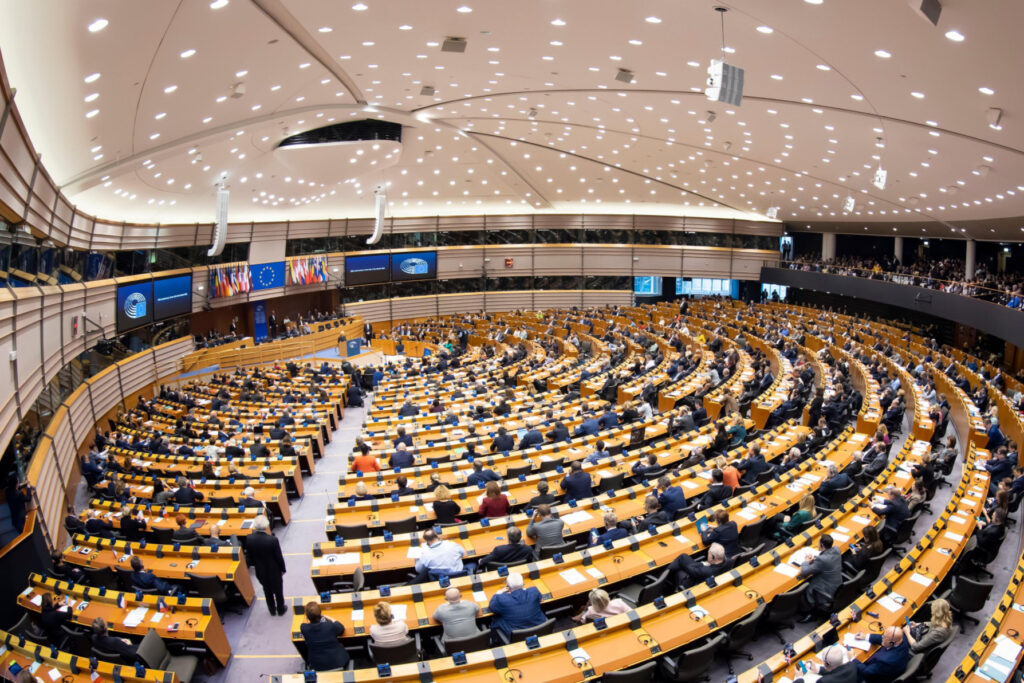The European Parliament has passed a resolution supporting Armenia’s prospective application for EU membership and its steps to distance itself from Russia, while warning Azerbaijan against ‘military adventurism’.
The EU Parliament passed its resolution on closer ties between Brussels and Yerevan on Wednesday, with 504 MEPs voting for the resolution, and four against, while 32 abstained.
The resolution stated that should Armenia apply for candidate status and continue carrying out reforms, it could ‘set the stage for a transformative phase in EU–Armenia relations’.
[Listen to the Caucasus Digest: Podcast | Is Armenia going to join the European Union?]
The following day, Prime Minister Nikol Pashinyan praised the resolution and stressed his government’s will to ‘continue the work towards further deepening and development of Armenia–EU relations’.
‘I believe it should become a subject of public discussion in Armenia. This is another opportunity to discuss Armenia’s vision for the future’, said Pashinyan, adding that the subject needed ‘a much wider response’ from Armenia’s public. Since March, senior Armenian officials have been vocal about Yerevan’s intention to apply for EU candidacy. In February, the EU High Representative for Foreign Affairs, Josep Borrell, announced the launch of an ‘ambitious’ partnership agenda with Armenia, covering visa liberalisation talks, and trade and security cooperation.
Security and peace treaty
In its resolution on Wednesday, the EU Parliament was outspoken in its support for Armenia’s steps to distance itself from Russia, welcoming Armenia’s decision to freeze its participation in the Collective Security Treaty Organisation (CSTO), a Russia-led security bloc, and to remove Russian border guards from Zvartnots International Airport, Armenia’s biggest airport in Yerevan.
Pashinyan announced that his country had frozen its participation in the CSTO in February, citing the bloc’s failure to come to Armenia’s defence in the face of Azerbaijani attacks.
The Parliament also recognised the ‘urgent need’ to strengthen security and defence cooperation with Armenia as it ‘reconsiders its membership of the CSTO’, suggesting that the EU ‘respond favourably’ to Armenia’s request for support via the European Peace Facility and to support the Armenian military.
It also warned that Moscow might try to use threats against Yerevan to ‘punish it for its independent political and strategic choices’ and that the EU needed to be ready to provide ‘rapid assistance to Armenia to mitigate the negative consequences of any such unfriendly steps’.
In October 2023, French Foreign Minister Catherine Colonna said that Paris had made an official request to EU High Representative for Foreign Affairs Josep Borrell to include Armenia in the scope of the European Peace Facility alongside Georgia, Moldova, and Ukraine.
The following month, the EU Council of Foreign Ministers discussed providing Armenia with ‘non-lethal support’ as part of the European Peace Facility.
The resolution condemned Azerbaijani attacks on Armenia and ‘inflammatory statements’ made by Azerbaijani President Ilham Aliyev about Armenian territory.
It also warned Azerbaijan against ‘any potential military adventurism against Armenia proper’, while noting that the EU should be ‘ready to impose sanctions on any individuals and entities that threaten the sovereignty, independence, and territorial integrity of Armenia’.
On Wednesday, Russia criticised Armenia’s decision to remove Russian border guards stationed at Zvartnots Airport, with Russian Foreign Ministry spokesperson Maria Zakharova stating that it was ‘unlikely that such an initiative meets the interests of the security of Armenia and its citizens.’
Russian border guards have been stationed at the airport since Armenia’s independence.
Zakharova warned that Yerevan’s current diplomatic trajectory could create ‘serious risks’ for Armenia’s sovereignty, as well as ‘destroying’ mechanisms ensuring the country’s security, and compromising its prospects of socio-economic development.




 14 March 2024
14 March 2024



